Scrivener. What can I say about Scrivener?
Well, in short, it kicks the collective ass of the other word processors I’ve used.
I first learned of Scrivener in October of 2010. I had come across a glowing review of a program called Liquid Story Binder and was intrigued enough that I decided to download the 30-day trial. This decision was followed by the Mac-user heartbreak of Windows-only software. Dejected, I searched for a Mac-friendly version and stumbled upon Scrivener. I was still hurting from Liquid Story Binder’s rejection; I downloaded the Scrivener trial, prepared to be disappointed.
Only then I was not.
I consider myself a novelist at heart, and from a purely logistical perspective, Scrivener makes it much simpler to get a handle on, and then keep track of, that sort of long project. In a traditional word processing program, I’d end up with a couple hundred pages all in one chunk, and if I wanted to navigate between scenes, I could scroll back and forth—or search for “Chapter Three” or a unique phrase. With Scrivener, though, I could organize it differently:
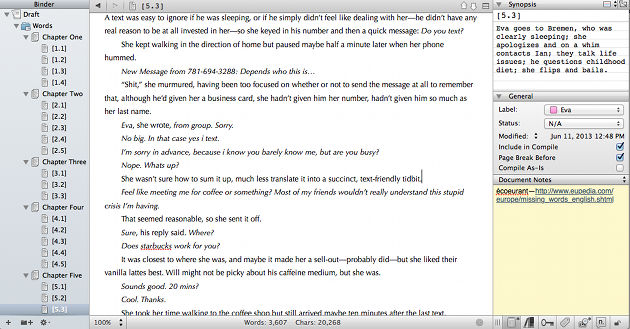
Along the left side, I have different levels of inclusiveness. If I want, I can select “Draft” and see the entire thing. Or I can select a specific chapter, or even a specific scene within a chapter. At the top right is another tool that helps with organization: the index card. This allows me to write a short summary of what occurs in that scene, so that I can look at a cork board visual of a multi-item section:
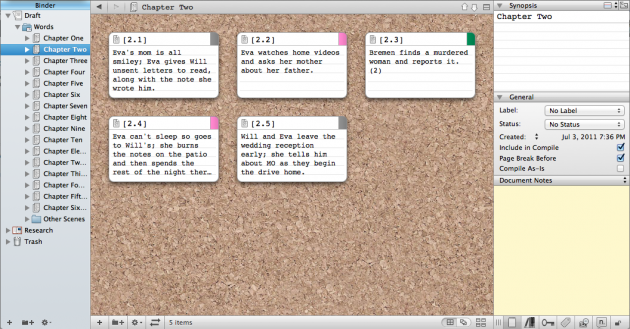
In that shot, you can also see the colored tabs in the corner, which come from the next box down from the index card editor: labels. In this particular project, I have multiple viewpoint characters, so labeling scenes with their narrator helps me see how that balances out and, if I want, view only the scenes from one character’s perspective. In the box below that are any notes I want to make that don’t need to show up on the index card.
Back on the left, below the actual draft text, is the research folder, where I can take notes and import PDFs, images, video and audio clips, and more:

Essentially, what this all adds up to is one document in one application that does everything I would do in several files in several applications in several levels of folders.
(All those features, by the way, made it very useful for taking notes in class, writing multi-part papers, and organizing my graduate school application materials as well.)
In case you’re wondering, yes, I can import Word documents. And what’s more, I can save my own writing as a Word document—or PDF, rich text, Open Office, and several eBook formats. With Scrivener, I can take a novel and format it for Kindle, including everything from a cover image and author information to a hyperlinked table of contents. This feature does require a bit of trial and error at first to get all the different formatting options set, but it’s worth it.
That’s my rating of Scrivener as a whole. Absolutely 100% worth it. At the moment, it’s $35–45, and it’s worth it. There is a learning curve, and although I’m not someone who typically does tutorials, I recommend the Scrivener one, which is worth it. If you’re part way through a project, or even working on revising a completed draft, transitioning to a new format takes time, but it is—you know where this is going—worth it.
On that repeated note, I’m off to my current novel in progress Scrivener.
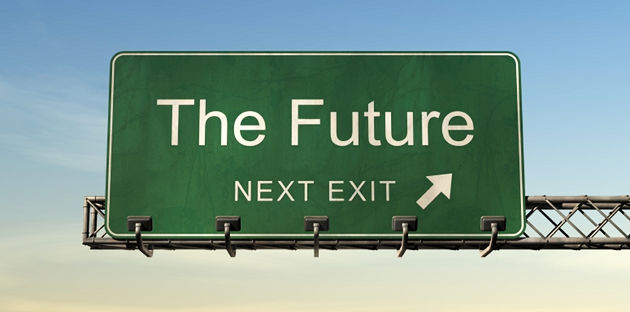
 The Mascot. While I can’t claim the cardinal is much more innovative than the eagle of my
The Mascot. While I can’t claim the cardinal is much more innovative than the eagle of my 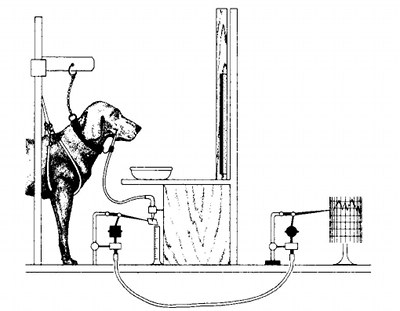 We all know
We all know 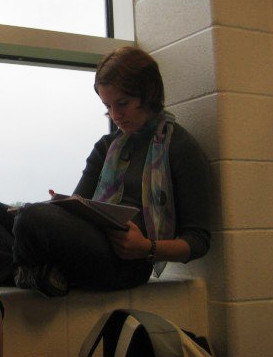
 After doing months of research, using up all my print credit and then some, submitting thirteen applications, and wishing I at least had some pins and needles to wait on so as to be a little more comfortable, my graduate school plans are taking shape. This fall, I’m going to begin working on a master’s degree in creative writing at
After doing months of research, using up all my print credit and then some, submitting thirteen applications, and wishing I at least had some pins and needles to wait on so as to be a little more comfortable, my graduate school plans are taking shape. This fall, I’m going to begin working on a master’s degree in creative writing at